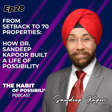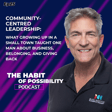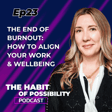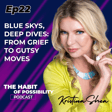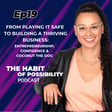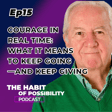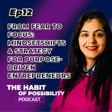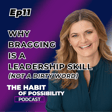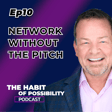Motivating Performance Through Intrinsic Qualities
00:00:00
Speaker
If you can tap into those intrinsic qualities about people, they are motivated to perform. They are disappointed when they don't perform because they you are a trusted ally who's helping them grow.
Podcast Introduction with Robbie Spear-Miller
00:00:17
Speaker
Welcome to the Habit of Possibility podcast, the show about turning obstacles into opportunities. I'm your host, Robbie Spear-Miller.
Introducing Guest Keisha Smith
00:00:26
Speaker
Today, sales manager Keisha Smith is joining us.
00:00:30
Speaker
For the past 20 years, she's been building high performance teams across the telecom, finance and energy sectors.
Cultivating Growth Mindset and Innovation
00:00:37
Speaker
We're going to explore how to cultivate a growth mindset and what it takes to encourage team members and organizations to be inspired to innovate,
00:00:44
Speaker
challenge themselves to contribute, and be proud of helping their fellow team members be more successful.
Stress Management Workshop Announcement
00:00:50
Speaker
Before we begin, we have a special announcement. We've been having many requests these days for help with managing stress and navigating all of the change happening around us.
00:01:00
Speaker
So we are offering a free one-hour stress management workshop, both in person at our training facility in Burlington, Ontario, Canada, and online via
Conversation with Keisha on Growth Mindset
00:01:10
Speaker
Check the link in the show description for more info and to register. Now, let's get started with this show. So welcome, Keisha. Thank you so much for having me. Yeah, it's so great to have you here on the podcast. And today, what we're going to do is we're going to explore the area of growth mindset. And Keisha, I know you've you've been very influential in the business world with growing teams and managing people and building businesses.
00:01:40
Speaker
And i I'm really interested to hear about what you've discovered through those experiences about growth mindset. Absolutely. You know, in order to grow, you have to have a growth mindset. And that means really tapping into what's what's happening well in your organization and what needs
Challenges in Skill Growth and Adaptation
00:01:57
Speaker
to change. And if you can duplicate or repeat the best practices where things are going well, you're more likely to have successes. You create better conversations with your customers.
00:02:07
Speaker
You have people that are growing new skill sets and are more effective on how they translate your business into new value and opportunity for the people that they talk to. And so it's so important to dig into those aspects and create a winning solution for yourself.
00:02:21
Speaker
Great. And what have you discovered are some challenges with building growth mindset in these situations? I think the nature of people, they really like to get comfortable in doing things a certain way.
Coaching Success Stories and Strategies
00:02:33
Speaker
And so it's really important that you encourage professional professional and personal growth um so that they are motivated to learn and change the way they do things so that they can become stronger and better and more effective.
00:02:45
Speaker
um And that seems to be something that kind of challenges the ability to kind of move someone who's very um comfortable with performing a certain way.
00:02:56
Speaker
into somebody who's motivated by trying new things and learning new skill sets. Okay, yeah. And do you have some stories of where you've seen somebody grow into this? Like maybe they started out being all comfy or avoiding challenge and then they, maybe they were in a situation where they didn't have a choice and they had to do it and that things really changed. Absolutely, like there's many scenarios and one in particularly, one of my team members were having a really hard time hitting goals and you know we had to sit down and one, have a real conversation about where they were against the expectations of where they needed to be.
00:03:33
Speaker
And some of the things that were impacting that We listened to their calls. We took a look at how their conversations were going with customers. And we identified that there was some missing strategy in those conversations.
00:03:44
Speaker
I paired them up with higher performers so that they can get a little bit of a feel of what is working um for people that are performing a little bit higher. And then we started setting like little micro goals to say, you know what, let's implement this tactic.
00:03:58
Speaker
Right. and see how it changes the conversation. Instead of using closed-ended questions, let's start with open-ended questions and really listen to the how the customer responds and use that information to fuel the yes momentum in the products and services that you're selling.
00:04:13
Speaker
And so those little changes, and it's so interesting, as they applied each of the learnings as we went along, their weekly coaching sessions, they started to become more confident in the tactic. And then they started to repeat it a little bit more and a little bit more.
00:04:27
Speaker
And then eventually they became... a person that had all of these tools in their tool belt that they can navigate conversations really smoothly and it just allowed them to be more effective.
The Role of Communication in Leadership
00:04:37
Speaker
the um The overall their sales increased by about 30% and then over time they became one of the top performers in Ontario which was really really i impressive and and now you know when they say one teaches to learn um you know they started becoming the teacher.
00:04:52
Speaker
because they had so many proven ways and tactics that they used on calls that they started teaching those that, you know, were still coming along that growth. Wow. And I bet they were also passionate about passing it along because it must have felt so good to for that person to show themselves what they could do.
00:05:10
Speaker
Absolutely. i'm Not only did it feel good, they benefited. They got paid higher commission checks, which, you know, really helped the situation for their family. They were able to buy a house and a new car and provide for their family and kids.
00:05:23
Speaker
And they became an expert. And so that is a transferable skill that they can take to anywhere they go in life in terms of communication being one of the most important things that we do when we interact with others.
The Value of Stepping Beyond Comfort Zones
00:05:36
Speaker
It just really translated into their ability to become a leader, um which they're now managing people. So that's great. Yeah, that's an amazing story. I love it. And the reason I do what I do here, which this is all about growth mindset and helping people show themselves what they can do is because for me growing up, I always was in a situation where I i knew I could do more, but I wasn't sure how.
00:06:00
Speaker
And I didn't have a ah bridge to get from where I was to where I wanted to go. So the work that we do here is that bridge. That's why I'm passionate about what we do here. And I've seen in myself and many people who come here for training that when you discover that, there's there's like the the degree of passion around it and appreciation for it is huge because it's you you you it's realizing your potential. it's It's finally taking your place in the world in a way.
00:06:32
Speaker
that's That's been my experience with that. So i don't know if if there are, you know, if you can relate to that or if you've seen other people do that, but that's really how I look at
Learning from Failure and Peer Influence
00:06:41
Speaker
those. Totally, and I see it in you, Robbie. You're so confident and you have such a presence because you understand how to communicate really well.
00:06:48
Speaker
And so when you can transfer that skill to other people, I can imagine the changes that you make in people's lives because we often think of ourselves in this box. And until you can see that the box opens,
00:07:01
Speaker
and you can create a bigger box as you expand your skills, you're stuck in this place where you're being underutilized. And so the confidence that you can create through your training programs, I can imagine the difference that you're making in people's lives. I think it's beautiful.
00:07:14
Speaker
It's a great mission to have. Yeah. So the the collaboration you described in that story is a really wonderful ah environment for people in a business because the business wants everybody who works there to do their best. yes Unfortunately, as we're growing up, often we're taught that we need to do our work by o ourselves and were it's competitive and it's not okay to copy. Like for me growing up, I had i have an older sister who was only a year and a half older And it really annoyed her if I copied what she was doing. And at school, if you copied somebody else's work, you were plagiarizing, right? You were cheating. You'd be kicked out of school.
00:07:54
Speaker
So it's I think it's very interesting to see the contrast between that and what actually moves things forward for society or what people actually need to thrive and to do their best.
00:08:06
Speaker
I think we have a lot of waste of human potential because of those lessons that we're teaching. Absolutely. Like I started on the phone. Actually, i started door to door selling chocolates for Youth Canada at about 10, 11 years old ah in the 80s. Right. So, you know, from there, i i was on the phones. I'm grassroots. I started as that person picking up the phones for an organization.
00:08:30
Speaker
um and and trying to sell and promote their products and services. And it took me learning from my peers and coaches and mentorship and taking courses and developing myself to become not only a sales leader, but one who works with high performance teams and can move the performance along to achieve extraordinary things.
00:08:49
Speaker
Without that, yeah I always say iron sharpens iron, right? Without that influence, you're kind of stuck on knowing what you're capable of. As soon as you're exposed to that learning, growth, development, being able to tell your story, a culture of openness and just sharing,
00:09:07
Speaker
The sky's the limit. The sky's the limit. A doctor doesn't know how to be a doctor until he learns, right? Right. And if you look at medical training, they do have internship and residency where they're in a hospital and they they're actually treating patients and they're in this learning relationship.
00:09:24
Speaker
And so I think we would all benefit a lot from having that more integrated into businesses and other organizations. um And in education in general, because if you grow up expecting that, then you're more open to it.
00:09:41
Speaker
Yes, absolutely. And, you know, a lot of people would love to just live the mundane and never learn. And then they will just continue on the same path in order for you to grow. You have to accept new challenges and be willing to do things that you've never tried before.
00:09:55
Speaker
And just, you know, really understand your skill set and see where you're strong and where you have opportunities.
Personal Stories of Motivation and Growth
00:10:02
Speaker
One of the key things I like to do is take a person's strengths and show them how those very strengths can feel some of the areas of weakness um and show them how they can actually change a weakness into a strength by just focusing on it, practicing it, refining it, and gaining insights from the people around them. So,
00:10:19
Speaker
o Yeah, amazing. Yeah. I had a ah student here once who, you know, in our classes, we learn a lot about how to take responsibility for ourselves and show ourselves what's possible. So she was doing this with her child.
00:10:33
Speaker
I think her child was maybe like eight or nine years old. And so she set it up so this child needed, usually they would want something and the parents would give it to them, but she changed it so the child had to earn it. Yes.
00:10:46
Speaker
And she she said it was more fun because she had to earn it, right? And she was so proud of herself that she earned it. And I think that there's this human desire for that, right? Like we we want to show what we can do.
00:11:02
Speaker
And if we're given too much, we sometimes people don't even know what that means. They never have that experience. They don't know what's missing. Right. There's a level of complacency when you're not trying to continuously grow that is really, um I don't know what word to use. It's almost um pacifying. It's almost...
00:11:25
Speaker
It almost keeps you down in terms of potential. um My daughter is autistic and, you know, they said she would never be able to live on her own. She would never be able to talk because she went nonverbal when she was 18 months.
00:11:39
Speaker
And I remember she went from being able to say mama to not being able to say mama at all, um as well as other colors and things. And so we put her through a therapy experience. And she went through ABA and IBI, intensive behavioral intervention, and she still does a little bit of IBI today.
00:11:53
Speaker
But now she's learned so much through them testing her action and reaction, teaching her different ways of responding. Um, to the point where if you saw her today, you would have no idea.
00:12:04
Speaker
She's very neurotypical. You would have, because she has all these control mechanisms to control her anxiety and her um reaction to outside that um um stimulants and all of these things to the point where she's a straight A student, 1B.
00:12:19
Speaker
you know and i And I do motivate her. I pay her for every A she gets on her report card and every 100% test she brings back home. But that motivation,
00:12:30
Speaker
I guess you can say stimulus of just saying you're capable of more. And when you achieve more, here's what I'm going to do we' to reward you. Has her thirsty for that constant achievement, which many people don't always have intrinsically. So we have to motivate that out of people in our interactions with them.
00:12:46
Speaker
Yeah, and that's where human progress comes from, right? And contribution. And otherwise, we're just kind of possibly consuming the
Encouraging a Producer Mindset
00:12:57
Speaker
world. Absolutely. One of the things my husband said to my kids when they were younger is he said, you have to decide if you want to be a producer or a consumer.
00:13:06
Speaker
I love that. And I think that making that distinction so you see, hey, am I contributing? Am I stretching myself and you know doing something? Or am I just consuming what's given to me? And I believe that everybody really benefits from becoming ah a producer on some level somewhere in their life. It doesn't have to be all the time. And of course, it's fun to be a consumer.
00:13:32
Speaker
um but I think we the human spirit needs that. The balance. It's so funny, my dad's whole thing, is it a need or a want? Right. Yes. That was his kind of narrative on that. And it was interesting because when I thought about it, I'm like, I want this, but I don't need it.
00:13:48
Speaker
And when I focused on the things that I needed, i received more than I wanted. so So it was kind of cool for him to change my psychology into thinking of what is it that you truly need to move to the area where you can get what you want.
00:14:02
Speaker
um It's a psychological shift for sure. Yeah, and if you're doing something of value, you will get clip things with you want. But it's if you just put the things you want first without giving the value, then it doesn't work the same.
00:14:17
Speaker
And I think too, as you say that, it's like there's the values that you have, but when you're working for an organization, you need to tie yourself to the values of the organization. And a lot of the time that's growth, increased revenue,
00:14:29
Speaker
increased customer base, good positive customer experience, a good brand and recognition. And in order to achieve those things, if you if you know if you're not exposed to strategic ways to go about building that type of an essence in your interaction, you'll never be able to align with what the organization's true requirements are.
00:14:48
Speaker
And so you probably won't very ah last very long there um without that construct. So yeah. Yeah, I'm curious to to to explore with you how the art of doing that because I used to work in IT. I worked for an IT consulting company for seven years. That was my former career. wow And which I learned a ton from that experience. There were so many great things about it.
00:15:10
Speaker
i will say that the way people were managed and maybe part of it was my personal response to that it really was unmotivating to me. Like they could have gotten way more value out of me than they did.
00:15:24
Speaker
But they set it up so that we were competing, the the different programmers were competing against each other. And if you made a mistake, it could like tar you for the rest of your career at that company.
00:15:36
Speaker
So there wasn't this um environment where everything we were doing was new. It's tech. You had to learn new things all the time. it was consulting, so every project was new and different.
00:15:49
Speaker
And so the nature of it was that we had to keep learning and experimenting and making mistakes. But there wasn't a lot, at least I didn't perceive or my experience wasn't that there was a lot of room for that.
00:16:02
Speaker
it it became very political and very much about your reputation. You had to take care of your reputation. Whatever project you worked on last was the thing that would determine what you got to work on next. So nobody wanted to work on the projects that weren't very ah cutting edge.
Fostering Supportive and Innovative Environments
00:16:20
Speaker
And so that that environment really didn't make the most of people's skills, in my opinion. and my husband, he we met in tech. We met at that company. So we've been married for 22 years now and together for 25 years. Amazing. and Yeah, I know. It's hard to believe.
00:16:38
Speaker
um So he still works in tech. And the company he works at now, I find they're very good at balancing what the individual It motivates them and what they want to need and being real and honest about that with what the company needs. So I'm just curious to hear your take on the art of doing that because I can see why the company I worked for ended up in the dilemma they were in. So it's really interesting to learn about how do you navigate that from a a management point of view. Absolutely. As a professional coach, you have to create an environment where it's okay to make mistakes and you're not penalized for those mistakes.
00:17:19
Speaker
The reason that is, is because when you penalize ah person, they there's a sense of I'm not worthy, I'm not good at this. And it's it's almost demotivational. It's the opposite of what you want to do. You want to motivate people to want to learn, to put forward their best effort.
00:17:35
Speaker
And if there is constantly, don't get me wrong, we're competitive. but we're not competitive while um ah creating a negative negative experience for the people that didn't achieve. We're highlighting the ones that are doing, and we are we are we are um kind of defining how, you know,
00:17:54
Speaker
how they were able to achieve this level of success to motivate others to try to get there and to use the tactics that are going to build them to be able to get there. And so I think in the model that you just described, I bet you after getting called out a couple times or feeling or being penalized a couple times, it's almost like you want to hide. You don't want to be seen. Yeah. And so we want an environment where every individual is pushing to be seen because they understand that they're capable of of achieving similar things across their
Modeling Success for Collective Growth
00:18:27
Speaker
Right? um I wouldn't want to work at that place. I'm glad I no longer work at that place. You know what? It served its purpose. But you know what? It wasn't from bad intentions. I think that they met well. And maybe at that time, because this was 25 years ago, right? At that time, people didn't look at things the same way we do now or understand this the same way.
00:18:49
Speaker
um So I'm sure there were factors about that. But I think that that it's very, the the culture of knowing you're supported and being that people care about you and they want you to succeed and and nurturing that makes a big difference because there's something about somebody believing in you, right? And a lot of people have never had somebody really believe in them.
00:19:15
Speaker
For real, right? Like somebody who's like on their side and wants to see them successful. There's amazing power just from that. Absolutely. Yeah. And there's alignment through that.
00:19:26
Speaker
When you feel like there's a mutual interest, there's a mutual trust. We all have, you know, we're aren we're in this together. yeah you know I rarely made decisions for the team without making sure I got their input and their feedback, because now they are aligned and feel a part of the decision. And it's not me making it for them, it's us making it as a collective.
00:19:46
Speaker
And so you know every individual understood where their individual performance impacted the bigger picture. um and they And the ones that were superseding also knew that they were a greater piece of the achievement than others,
00:19:59
Speaker
But it was never to put anyone down, it was more so to say, here's what I did to get there and here's my story. And sharing those stories can really produce amazing things in other people in terms of motivation.
00:20:11
Speaker
Yeah, that's awesome. And and so you're you're creating this culture of modeling yeah where you're modeling success and people feel like they can
Holistic Personal Development
00:20:20
Speaker
do it too. And we do that here as well. And you know sometimes I look at what we do here at Hypnosis Training in Canada and the experience people have is I kind of took all the things I wish had been part of my education or my work life And we're creating those things here, right? All the things that were missing in your education or in the work culture you're in or in your family life.
00:20:44
Speaker
um You know, some of my motivation to do this is when i knew I wanted to have kids, but I didn't have them yet. I realized there were things about, there were things in me that I didn't love, right? And not not that, like, i it's not that I didn't love me, but I knew there were behaviors or ways of dealing with life that weren't working. We all have them, yes. We do, yes. And and so and I would get so mad at myself and say, I should do this and I should do that. And why can't I be like this person or that person?
00:21:13
Speaker
And it really changed when I started to learn what we do here. And I started to ask, you know, how can i how can I learn how to be more like that? So some ah one thing that really drove me to get better and better at that is that I knew I wanted to be better for my kids. Because let's face it, kids eat and sleep and breathe how we are as adults. Yes, it's so true. They mimic.
00:21:35
Speaker
And the more we can function well, the the they won't even know it. They'll just function well because they grew up that way. and so So it's wonderful to be able to give them that. And I i really, um you know, it's it's great to see my kids.
00:21:51
Speaker
not appreciate that, right? That's good because they natural to them yeah they didn't go through the things I went through, right? And I look at them and say, wow, look at what you can do. And you know it's, yeah, but I think that that's a lot of it. So, um you know, one of the the passions I have is helping people learn how can they really, you know, come at life in a way that they're a more fully developed person.
00:22:17
Speaker
that they're filling the the gaps that maybe were there growing up. And most of us have them in one way or the other. We can have the most well-meaning parents and we can have them, or we might come from a very challenged situation and have them.
00:22:31
Speaker
But sometimes the situation isn't the thing that determines that. it's It's how we've adapted to it or our other life experiences. Oh, totally. We don't learn much from just being successful. It's where we fail is where we pick up the kind of nuances of new learned and how to change and how to pivot and adapt.
00:22:50
Speaker
One thing I noticed about your programs is they teach you some of the things that some people are not consciously aware of, like body language, tone, pitch, pace, volume. These are very important.
00:23:01
Speaker
You know, 80% of that is how people see you and how they receive you. you And I think it's so beautiful that you've like really ironed out, you know, what that looks like and means in a conversation, in communication, so that people can learn how to present better, how they can be more confident, how they can appear more confident in their presentation.
00:23:19
Speaker
I just thought it was amazing when I saw the programs you offered because a lot of that is not known by the average bear is the best way i can put that. true So the fact that you've gathered all of this knowledge and have it as an outlet for people to really expand and grow is just a wonderful thing. You have great purpose.
00:23:34
Speaker
Yeah, yes. and And those are amazing people skills and communication skills. and I'll add to that, that um as people make peace with themselves and they build their own confidence and then they learn those tools, it's easier for it to all flow and come together.
00:23:52
Speaker
But if somebody's at odds with themselves, they could learn those skills and still struggle because they they're not in sync, if that makes sense. So we really want the whole person to be. To show up. Yeah, to be kind of all moving in the same direction so that it it's more natural.
Training Programs Enhancing Communication
00:24:09
Speaker
And i once had, i I trained this guy. He was.
00:24:13
Speaker
He came to me for one-on-one coaching and he was the head of a sales team at a pharmaceutical company. So he wanted to learn these skills so he could go and teach them to his team. So I was doing one-on-one coaching with him and and he had learned some of the skills we learned here about body language and connecting with other people and you know mirroring them and things like that. And one of the things he was taught was that you want to be in the same position as the other person. So if they're standing, you stand. If they're sitting, you sit. Equality, like that equality in the dynamic. Yeah.
00:24:44
Speaker
But he was very robotic about it. So here I was, you know, it just me and him. And he was a former OHL hockey player, six foot something, right? Big, strong guy. Yes.
00:24:55
Speaker
And I wanted him to have a seat so I could teach him something on the whiteboard, right? And I could be the teacher because I needed to be in that role. But because I was standing, he wouldn't sit down.
00:25:07
Speaker
And he couldn't acknowledge like the context he was in and be flexible about that. And so it can get awkward when people are too hung up on the rules. Yeah. And so we really teach this in a way where people get the nuances of it and they are ah integrated in themselves so it's easier to respond to reality in a useful way. I love that because now they know when want to appropriately apply it, which is a hard thing to come to by yourself.
00:25:34
Speaker
Well, and you know, hey, it's never 100%. We all have our moments, right? yeah But it was kind of an extreme situation that way, you're right? It really took a lot. Finally, he did sit down. You know, it was a good teaching moment. and But it shows you how important it is to learn these skills in the context of the whole person in social interaction, not just rules. Absolutely. It's so important. Dynamics change all the time. Yes.
00:26:00
Speaker
Right? So now they can lend to how do I behave in these circumstances and how do I add to these dynamics? How yeah do I create better experiences right across the board? Yeah. Yeah. Great.
00:26:11
Speaker
So are there other stories or examples that are occurring to you as we explore those? Oh my gosh, there's so many. You know, I've gone into organizations and, you know, through intentional culture building, conversations, team collaboration, engagement,
00:26:28
Speaker
um Letting people think critically, allowing people to bring their honest self to the table, their authenticity, um increased results up to 12,000%. And so, you know, it's just a matter of being intentional, being patient.
00:26:44
Speaker
encouraging people, showing them what they're so good at from your observations or how they can use their skills to sharpen the pencil or sharpen the needle.
Personal Goals Driving Professional Success
00:26:52
Speaker
ah Appreciating them, appreciating them for sharing their opinion, allowing them to be um um I think the word that I'm looking for is like reflective.
00:27:04
Speaker
Like a lot of people don't listen to their own voice or they don't sit and have an opportunity to truly observe themselves. So I do a lot of self-discovery coaching and talk about like when that question was asked, tell me what information you wanted to gather from the customer.
00:27:19
Speaker
Is there a little bit more or a different way we could have asked that to gather more information? Did you get what you wanted? Right. Out of the approach. And sometimes they imagine that other people know more than they do. Yes. So they they think somebody else expressed an opinion and just because they said it confidently, they they think that they know more. Yes. When really they're just one of those extroverted people who knows how to say things confidently. Totally. So bringing out people who might not normally share it their ideas or trust them um or believe they're valuable can be a really...
00:27:52
Speaker
important thing. And trusting that they have an idea of where they want to grow in. And if you can motivate the areas where they know there is a disadvantage or an opportunity, the trust that you build as like a personal relationship between you and them as the coach and to the rest of the team when they start relying on the expertise of their peers and the experiences, that's where you find the winning tangible stuff that you can repeat and systematize. So Yeah, yeah. Well, to to a company, this is worth so much because you pay people and you can get a little bit out of them or a ton out of them.
00:28:33
Speaker
And so being able to nurture people in this direction really dovetails with the business's goals. And the more businesses really see and appreciate that, the better they're going to do. Absolutely. I used to tell people when we came to a goal, I would say, demonstrate the goal and tell me what time the call happened so I can go back and we can look at how you did against the goal that you set for yourself.
00:29:00
Speaker
And that gave us some really specific examples instead of digging through a bunch of random calls. Let's dig into the ones where you think you demonstrated that goal to the best of your ability and figure out the small tweaks that we need to make to refine that to get it to be what you truly need it to be.
00:29:15
Speaker
And that was just so motivating for them because they were so excited to see their own performance. And, you know, it has to be a mix of here's what went really well with how you approach that.
00:29:26
Speaker
And then if you just add this or that or what what would happen if we threw in this question, what do you think you would have gotten out of the experience and such? Then they start being creative and, oh, I could have said this. and You know i mean? You just open up a dialogue that wouldn't have been there with a really strategic and intentional approach. Yeah.
00:29:43
Speaker
Yeah, so many people have so much to offer. And you know over the years, I've seen, I've been doing this for almost 20 years. yeah So I've seen thousands and thousands of clients and from all walks of life.
00:29:54
Speaker
And one thing I've observed in that experience is that there are people who are super smart and capable, but they don't believe they can do certain things or they see their life a certain way and they don't really stretch themselves.
00:30:09
Speaker
And then there are other people who, Maybe aren't as capable, but they believe they can do something. And so they they are at a different place in their life. But it's not necessarily from their basic abilities. It's it's what how they grew up or their expectations or the situation they ended up in.
00:30:28
Speaker
So I think we have all of this human potential available to us that could be you know nurtured and expressed in ways we're not even imagining yet. oh I think that's pretty exciting. Oh, for sure. Like when there are corporate goals that of course I set, but I also look at personal development goals because I believe that when someone is motivated to improve personally, that just benefits an organization naturally.
00:30:55
Speaker
And so we do a bit of both so that they understand, i care about you as an individual, which I truly do. I want to see them expand and grow and see themselves as this machine that can accomplish anything.
00:31:08
Speaker
And when they when you change their mindset into that, When you set a difficult goal or one that is new or they've never had to cross, they're more motivated to try it because now they've expanded their ceiling.
Entrepreneurial Thinking Within Teams
00:31:21
Speaker
Right. So it's something that I like to do is not just focus on your KPI number. No, no, no. Let's focus on the skill set that's going to allow you to just be a holistically brand new person in terms of something you've never tried before.
00:31:36
Speaker
And people are going to want to stay on that team because they're going to go, wow, I'm never going to have another manager who who cares about this or who lets me grow the way I want to grow. Absolutely. So it's wonderful. to People spend so much time at work. They may as well appreciate it and enjoy it and look forward to it and you know be in that creative, whatever their creative zone is.
00:32:01
Speaker
um Totally. And it becomes a reflection of the organization because now it's like the organization has hired professionals that really want me to grow in all areas of my life. It's not just about their personal interests. It's about me as an individual and I enjoy being here and I'm going to bring my best self to it because they're so interested in my personal growth as well.
00:32:21
Speaker
Yeah, and it almost sounds like it's very a very entrepreneurial team that you create because you're getting people to really own responsibility for their success and also for them to see the impact they're having on the organization and the possibilities they have because of it.
00:32:38
Speaker
And then they're more motivated to do something about it because they see what's possible. Yeah. Yes, that innovation shapes cultures. And so when you can create an environment where people actually strive to be innovative, they're brilliant. They come up with the coolest stuff. I would never, with all of my 20 years of sales management experience, I would never come up with on my own.
00:33:00
Speaker
yeah And so we have whole group of people that are just brilliant. They're creating new ways. They are like at the forefront of change, of improvement, of new execution, stuff that an organization doesn't always have the time to do on their own and come up with on their own. So yeah it's really great how we're able to innovate through these conversations and create really good experiences as a team.
Fostering a Collaborative Work Environment
00:33:25
Speaker
Yeah. Is there other um advice or tips you could share? Maybe we have people listening who manage people and would want to learn what they could do to improve their ability to nurture this on a team. So what would you suggest they do?
00:33:41
Speaker
Totally meet with your people often and make those meetings positive so that they're looking forward to the next one. You really want to create an environment where they're actually wanting to meet with you more often than you have time for. it And that just makes sure that when you do meet, there's a clear agenda that both of you have in terms of needs and that you're having an open and honest conversation about the areas that they want to improve in.
00:34:04
Speaker
Allow people to just be their authentic self and let's Listen to their humor, their interests, learn about their family, you know, look a little bit about the things that motivate them. If you can tap into those intrinsic qualities about people, they are motivated to perform.
00:34:20
Speaker
They are disappointed when they don't perform because they, you are a trusted ally who's helping them grow. So I think those are some things that we can bring to coaching discussions. Do as much collaboration as you can across the team, learn from Beck's practices,
00:34:35
Speaker
and actually create them in a way that they're measurable. And you can actually teach. um They say like one teaches to learn. So allow not just, you're not the only teacher on the team.
00:34:46
Speaker
Let every single person based on their skillset and strengths, transfer knowledge to your team. It will help everyone grow a lot quicker um than just you by yourself. Yeah,
Addressing Competitiveness Positively
00:34:57
Speaker
One more question. yeah I'm just reflecting back to my time working in a ah larger corporation and some of the dynamics we saw there were people were very protective of their skill set where they they wanted to keep the advantage so they didn't necessarily want to help other people or share what they knew.
00:35:13
Speaker
So have you run into that on the teams that you've managed? Yes, salespeople often want to be at the top. i And so sometimes, a little selfishly, um you know they might hold on to little nuggets. And that's where I become the bridge because I get an opportunity to observe everyone's performance on the team.
00:35:34
Speaker
And I can share lessons. And I do it in a strategic way that that person, because that's what's motivating them to withhold, I actually highlight them and make sure that everyone knows that this nugget came from them.
00:35:47
Speaker
And so it really opens things up in that now, al They are encouraged because they want to be called out on their skill set. It gives them an opportunity to be seen throughout the organization.
00:35:59
Speaker
It enhances their leadership quality in terms of their ability to teach and to actually um makes them a bigger contributor on the team.
00:36:10
Speaker
And then when they see how that their peers have increased in performance, they almost take a piece of that as their own because they were a part of it. They were a part of the overall performance of the team. And as a collective, we all grew.
00:36:24
Speaker
And we highlight those people as often as we can um to make sure that they are continued to be encouraged to do that. Awesome. I love it. Yeah, that's great. And so you're you're really looking at what what are the what are their needs or what motivates them. Yes.
00:36:39
Speaker
And you're you're incorporating that into this team cooperative strategy so that they can use their competitive nature to actually benefit everyone. Yeah. Yes, and those are the people I'll choose. Like if I'm on vacation, they'll be my in charge.
00:36:54
Speaker
I give them additional opportunities because they show that they have the pedigree already and the skill sets to actually move into other roles and get them ready to transition. It's not just about the role you're in. ah They always say dress for the position you want to have.
Podcast Conclusion and Contact Information
00:37:09
Speaker
try to dress each member for the position that they want to have through coaching and development for sure. Amazing. Great. Is there anything else you want to share? No, just thank you so much. I think you offer a wonderful suite of services that help boost any team's performance in terms of just moving the needle on awareness and strategy.
00:37:29
Speaker
And I think that a lot of people would be beneficial to come here and learn from you because you've really packaged it in a way that you cover so many corporate objectives. that are hard sometimes for corporations to effectively put together, you'd be an excellent resource.
00:37:45
Speaker
You can reach Keisha Smith on LinkedIn. Join us for our free one-hour stress management workshops. Go to the link in the show description to register. And if you're interested in connecting with me and learning about personal and business coaching, consulting, and training opportunities,
00:38:02
Speaker
go to and schedule your free consultation. Let us know what you think of this show.
00:38:13
Speaker
Reach out to us at mindlinkconsulting.com. And if you like this show, please rate and review us so other people can find us too. Thanks so much for tuning in. I'm Robbie Spearmiller, the host of the Habit of Possibility podcast. Tune in next time to learn more about how you can turn obstacles into opportunities.
00:38:31
Speaker
and make the most of your life and career.


